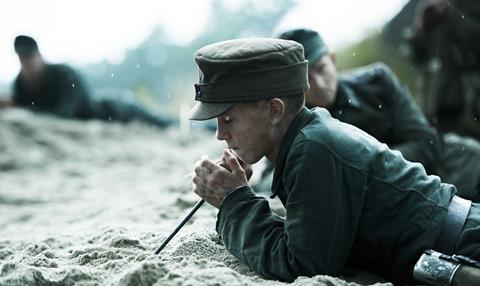It may be set immediately after the Second World War, but Danish Oscar submission Land Of Mine feels like required viewing in the current climate.

Land Of Mine explores a little-known and morally complex chapter in Danish postwar history when German PoWs, some merely teenagers, were forced to clear 2 million German landmines - with their bare hands - from the west Danish coast after the invaders retreated at the end of the Second World War.
In the film, the German boys are overseen by Danish Sergeant Carl Rasmussen, who wants to punish the Germans after a brutal five-year occupation. When he gets to know his young charges, however, he begins to show more empathy for those he viewed as enemies.
“It is a universal story,” says writer/director Martin Zandvliet. “In every war, in every country, we have the aftermath of war. It’s important we learn to forgive and look at each other with understanding instead, or at least not see everybody as the enemy. Being stuck in the past builds hate; looking ahead makes us united. That’s very present in the life we live now. Look at Kosovo, Afghanistan, Syria… who’s going to clear those mines?”
Land Of Mine has intimate moments with its characters, yet it is not afraid to show the epic scale of the landscapes around them. “It’s a director’s responsibility to give the audience good production values, to make them feel like they are entering a universe,” Zandvliet says.

Land Of Mine was shot in a military area on Denmark’s west coast, on the same beach from which mines had been cleared 70 years ago. “It was hell,” Zandvliet says with a laugh. “Making movies outdoors, you’re never sure when it is rainy or sunny or windy and you have to wait around a lot.”
The film had its world premiere in Toronto’s inaugural Platform section in 2015, where it received an extended standing ovation (“totally overwhelming,” the director recalls) and was acquired by Sony Pictures Classics.
“What has surprised me is that in Toronto or Sundance or France or Belgium or Japan, it touches people and they relate it to their own history,” the director explains.
At home in Denmark, the film won six Robert Awards (including best film) and moved many audiences, grossing $1.7m at the local box office. It also inspired a lot of debate about “what parts of the past you are allowed to fictionalise”, Zandvliet says.
“I did get my first hate mail telling me I wasn’t a real patriot,” he remembers, although he was not trying to demonise the Danes in the film. “I am not setting out to assign blame or point fingers. It is interesting to see a movie that doesn’t look at the Germans as though they were just monsters. It’s ultimately a movie about humans. This is the story of young German boys who were effectively sacrificed. But it takes you on a journey from hate to forgiveness.”
























No comments yet